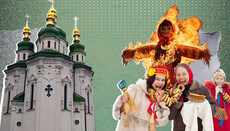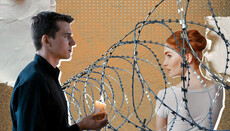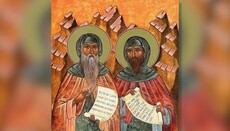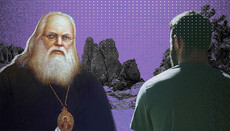How to forgive God?
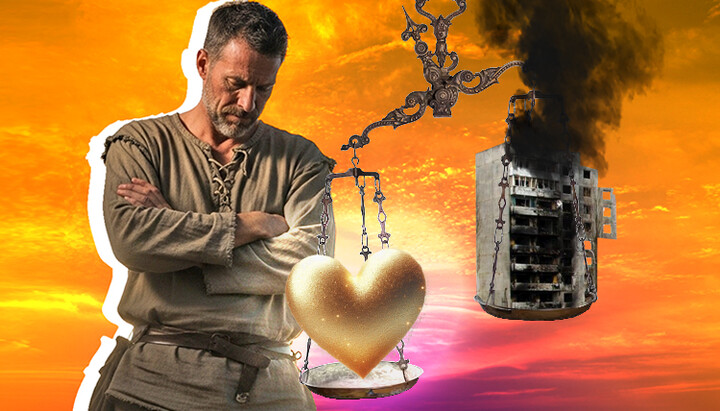
We strive to forgive others – and even God Himself. How can one find peace of soul in an unjust world such as ours?
The Parable of the Merciless Creditor
The parable of the merciless creditor seems simple and clear. It completes and illustrates the prayer of the “Our Father”: “Forgive us our debts, as we also forgive our debtors.” If we wish God to forgive our countless sins, then we must learn to forgive those who are indebted to us.
In truth, the parable confronts us with a question, and at the same time gives us the answer: “Whom do you want Christ to be for you at the Last Judgment – prosecutor or advocate?” You choose His role yourself. If you will act as an advocate before God for your offenders and enemies, then you yourself will be granted the right to take Christ as your Advocate.
Everything would be easier if this parable did not force us into the most difficult choice in the world – a choice that can only be made by radically changing our very worldview.
In a monastery the lesson of the parable is clear. Forgive your abbot if he is unjust; forgive a brother if he is harsh with you. Forgive all, for all, forever. Enter into the spirit of the holy fathers, who wrote so beautifully of this. Bring into life the model of human unity patterned after the Holy Trinity: one nature in many persons, living in love and concord.
Crush your “I,” your ego. Do not divide the world into “me” and “others.”
There are no “they” – there is only “we.”
Treat another as yourself, desire for him what you desire for yourself. Look more closely, and you will see Christ in every man. And you will find happiness in this life and in the age to come.
Forgiveness in a secular life
For a monk, such words are like a song. But not for laymen, who boil in the hell of modern life.
If you are alone, without family or children, you may struggle against yourself and learn to love, to forgive, to humble yourself. For every sorrow touches only you.
But what if you are not alone? What if you are bound to children, to those you love? How can a father forgive the judge who, for a bribe, acquitted the murderer of his family’s only breadwinner? How can he forgive the man who violated and killed his daughter? How can we forgive those hired to destroy our small worlds – our cities and villages, our homes – reducing them to ruins, depriving thousands of health, shelter, hope for even a modestly peaceful old age?
Could we really embrace such a one and say: “Yes, you defiled my daughter, you killed my wife, you destroyed my house – but it is nothing. I still love and forgive you. After all, we are both children of Adam. I hold no grudge.”? For me, at least, this is impossible.
And yet, looking back upon history, I think of what happened not even a century ago. Innocent children and peaceful civilians died then too. The elderly lost their homes. Mothers were bereaved, wives widowed, children orphaned. None of them remain now – neither those who killed, nor those who were killed; neither the tormentors nor the tormented. But surely they are somewhere still?
I am convinced: what was begun in this world continues in the world beyond. And perhaps the victims now rejoice that they were not executioners, that they did not drive others into gas chambers, but were themselves driven. For even an atheist’s soul whispers that every deed will be accounted for.
But the parable is not about that. It is about something else. It is about this: we must forgive – not in the next world, but here, on this sinful earth. And not only men, but God Himself.
For is there not much one could accuse Him of? Must we not forgive God for giving normal children to others, while my child was born disabled? Must we not forgive Him for burdening my life with poverty, illness, and sorrow, while others live “in chocolate”? Must we not forgive Him for taking my child, or my young wife, or my husband with cancer, leaving me alone – when I am no better but also no worse than anyone else?
The most foolish thing I have ever heard from the clergy is their attempt to justify God in such moments. I believe even God Himself dislikes this. In the Book of Job, He says outright: “You have not spoken rightly about Me” (Job 42:7).
An unjust world: Why does God keep silent?
So what are we to do? How to forgive others – and forgive God?
We must step aside and look at all this from a distance. What do we see? That all people live in an unjust world. And God has not hidden this from us. “The race is not to the swift, nor the battle to the strong, nor bread to the wise, nor riches to the intelligent, nor favor to the skillful; but time and chance happen to them all” (Eccl. 9:11).
Christ Himself says the same. Those crushed by the tower of Siloam were not more sinful than others. The child born blind was not the result of his parents’ sins – he was born so that Christ might heal him. And that was good. But many others were also born blind and were not healed. We search for meanings, we ask “Why? For what? For whom?” And there is no answer. God is silent.
So mankind tried to restore justice itself: an eye for an eye, a tooth for a tooth. God permitted it “for the hardness of their hearts.” But in the end He commanded otherwise: “Vengeance is Mine, I will repay.” To us He said: do not interfere. And thus we live still in an unjust world, torn between our thirst for vengeance and God’s command to forgive.
The Lord promises that choosing forgiveness makes us far nobler than vengeance ever could. We cannot distrust Him. He knows what He is saying.
Trust in Divine Providence
But forgiveness is hard. Even when we forgive, we remember with our minds every wound, and with our hearts we still hope that, if not by our hand, then by God’s, our offenders will receive their due. And when vengeance comes in this life, we are glad – though we pretend otherwise. Yet God sees the heart.
Let us be honest: we do not know how to forgive – neither people, nor God. For forgiveness requires understanding. And we cannot understand God – why He created such a world, where injustice and cruelty reign. Why do African children die of hunger, while American children grow fat in excess? Why do some die of thirst, while others play with fountains? Why do some struggle to buy a few tomatoes for winter, while others waste tons of them at “La Tomatina”? Why are Ukrainians deemed less than Britons, Palestinians less than Germans, that their nations should bear such different fates? There are hundreds of such questions – and no answers. That is why they are called eternal.
But what for us seems meaningless and unjust, is not so for God. Our minds are small, His infinite. What we have discovered in studying the micro- and macrocosm shows this: the Creator has attuned everything with exactness and care.
A slightest shift in any constant – and the universe would collapse. Yet He adorned it all with taste, harmony, beauty – poetry woven into sound, color, matter. This is no mere pragmatic calculation, but the highest sense of beauty. It is poetry woven into sound, into color, into matter itself. Everything with Him is thought out, everything accounted for. And I would not be surprised to learn that even a single hair falling to the ground has its place in sustaining the order of the whole universe. Perhaps, indeed, the flutter of a butterfly’s wing sets in motion the vast mechanisms that govern the world’s harmony.
Everything is accounted for. Not a hair falls unnoticed.
Therefore, to suppose that the chaos of this world is outside His providence is folly. That I cannot understand it does not mean it is meaningless. He who sees past, present, and future as one whole has reckoned all things – even our free will. What we choose freely He foresaw before the world was made. Thus even our choices are encompassed in His plan.
Only one man received an answer to the eternal questions – Job. He too thought he could summon God to court and win, for truth was on his side. But when God appeared, Job fell silent. Not out of fear, but because he understood what we cannot yet understand. So will it be for us, when the time comes. For now – it is as it is.
Conclusion
We have only one path – to obey God and accept the world as it is, believing that with Him there are no mistakes. This is called trust. To believe that even pain, injustice, and evil have their place within His providence and play their part.
And if He says: “Learn to forgive” – then we must forgive, however hard it may be. For experience shows: no knight has slain a dragon without himself becoming a dragon. Good that takes up the sword of evil becomes evil. An angel became the devil by fighting for “justice.” And he now teaches men the same. God offers us another way.
While there is still time, let us try to expand our hearts – as Christ did on Golgotha.
It was done by Grand Duchess Elizabeth, who went to the murderer of her husband with forgiveness. It was done by the holy princes Boris and Gleb. Many have done it. Will you not try as well?
We entered this wondrous world of God through our mother’s womb – a world full of beauty and also of sorrow. But we know: here we are only guests. Still, this world matters greatly – for here, through experience, man acquires his true likeness. When the time comes, we shall go home – into the Kingdom prepared for us from the foundation of the world.
For now – endure, humble yourself, love, if you wish to be with God. And remember: even in this broken world, there is far more good and beauty than evil and ugliness.
